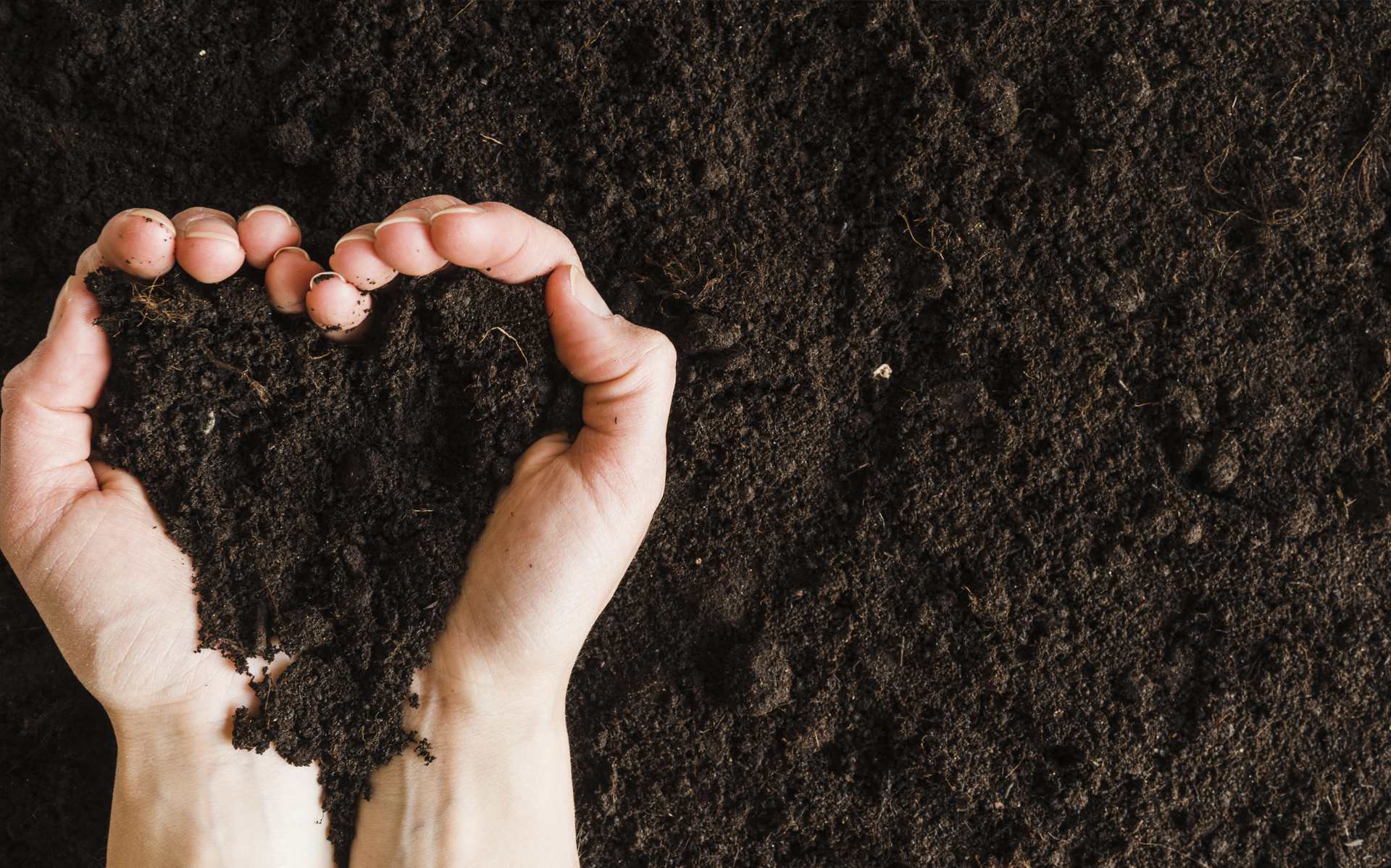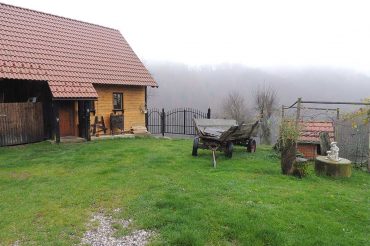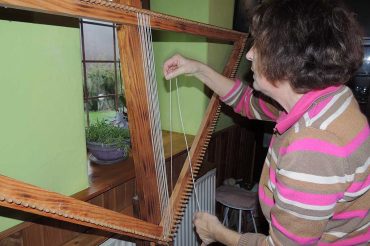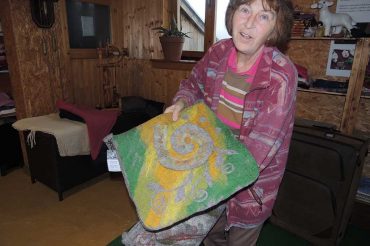INTRODUCTION
Twelve years ago, Erna Korošec and her husband bought 11,8ha of large estates in Haloze in the northern part of Slovenia near the border with Croatia. They first started breeding sheep due to the steep terrain, but now they have deer that do less damage to the field. Erna saw a good opportunity for the development of craftsmanship using the “waste” sheep wool - making clothes from real sheep wool of a domestic sheep breed (jezersko solčavska). Eleven years ago, she registered a supplementary activity on a farm tied to traditional handicrafts, for which she first obtained a certificate of arts and crafts, issued by the Chamber of Craft and Small Business of Slovenia on the basis of product evaluation. The first years of activity were mainly devoted to self-education on the production and use of wool. Now her woven, knitted and felt products, especially scarves, are sold at various events around Slovenia. She says that her hobby has grown into a small business, which guarantees her satisfaction and financial independence.wn into a small business, which guarantees her satisfaction and financial independence.

Women who are at home in the countryside can make from their hobies something useful, something for their soul and something for the comunity.
I am living my hobby and turning it into something useful.
1. PERSONAL DATA
Name
Erna Korošec
Age Range
46 +
Education
Erna Korošec graduated from high school at the Textile School in Kranj. She gained additional expertise to operate her additional business through self-education and persistent effort. In doing so, she used books and the Internet, and especially her gift of observing other women at work on various events.
Occupation
Handicrafts made of wool, in particular scarves, made from domestic wool of the “jezersko solčavska” sheep breed, hand-spinning and dyed yarn, taking into account the taste of current consumers. She works full-time in making and selling her handmade products.
2. FARM PROFILE
Address/coordinates
Pletenine Koštrun, Strmec pri Leskovcu 48, 2285 Zg. Leskovci.
Farm Area in ha
Size of the estate: 11,8 ha.
Date since when the female entrepreneur owns/rents the farm:
Since 2007, 12 years.
Nº of workers on the farms
| FULL TIME | |
|---|---|
| Family members | Other than family members |
| 1 | |
| PART-TME/SESONAL | |
|---|---|
| Family members | Other than family members |
| WOMEN | |
|---|---|
| Family members | Other than family members |
| 1 | |
Farm description
Erna and her husband bought the farm 12 years ago when her husband retired. The farm has the status of a protected farm because the area covers 11, 8 ha, which is more than 5 ha of comparable agricultural land and is thus guaranteed not to be divided. Due to the variety of the terrain, they started breeding sheep of the indigenous Slovenian breed – “jezersko-solčavska”. Their wool was treated as a waste to discard, so Erna thought of using it and starting making yarns. It turned out that the sheep for the terrain around the house were not best suited, so they replaced the herd of sheep with deer, which less damaged the banks. They breed these animals only for pleasure and their own use, it is not a profitable farm. When Erna and her husband decided to move to the countryside they just wanted to conserve the rural area in the way it was.
3. MULTIFUNCTIONALITY / RURAL CULTURAL HERITAGE
Erna Korošec eceived a certificate of arts and crafts in 2008, which is a precondition for the registration of supplementary activities related to traditional knowledge on the farm, services and products. Being a high school graduate, she already had some basic knowledge of wool. She started by washing sheep wool, spinning and making woolen products for the market. She offers knitted, woven and felt products. She specializes in making scarves, which she sells at various events around Slovenia. Her customers, in fact, are primarily foreign tourists who visit Slovenia.
The historic practice of making felt products is well known in the East part of Slovenia, in Solčava, where the autohtonic sheeps breeding is most popular. In East Slovenia, in Haloze, where Erna lives, the production of wine is more popular than breeding sheep. In this way Erna is an unusual case in felt production in Haloze. In the manufacturing of products, in addition to the wool of traditional sheep breeds, she also uses another type of wool, silk and cotton.
Her contribution to the preservation of cultural heritage is primarily through the process of producing wool products - from sheep to wool. This requires sheep wool washing, spinning, weaving, knitting. With her certified products, she participates in various fairs, festivals and local events that promote the preservation of cultural heritage.
4. CONSIDERATIONS, TRAINING / COMPETENCES INVOLVED
- General considerations
- Training/Competences (Knowledge, Skills, Attitudes) especially relevant for the process
Erna Korošec os an example of how a woman in her mature years can begin to revive the cultural heritage of the countryside and turn it into a business opportunity. She does not call herself an entrepreneur, but she is satisfied with the craftsmanship title. She earns her own money and this gives her confidence and some kind of independence. She says that women on farms are still heavily involved in farming and family care. The countryside still has many opportunities where women can use the experience and skills they have gained through their daily work as a business opportunity and thus gain more autonomy.
In the rural areas where they live, in Haloze, there is a lack of interest in networking among the local community, and the inclusion of handicraft activities in schools is too small. Foreign tourists are particularly interested in handicrafts. These products are, of course, more expensive as they require a lot of manual work, skills and creativity, which in turn guarantees uniqueness, higher product quality and personal satisfaction. This kind of work is also part of rehab for Erna, her health condition required a lot of handwork. With a sense of responsibility towards cultural heritage and a contribution to the preservation of the countryside, she wants the wool of traditional sheep breeds, which are often seen as waste, to be used in a useful way and to give it new benefit.
She sells her products at the most established events throughout Slovenia, to which she now regularly attends. It took her 3 years of hard work, trying and education to get her recognition. She collaborates with the Slovenian Small Cattle Breeders Association. For the past year she has been a member of the newly established Kasteli Society, which operates at Ptuj Castle and wants to revive old crafts customs. The connection with the Ptuj Castle helped a lot inselling her products. She was also working as a mentor of two students, who were in Erasmus exchanging in Slovenia and who wanted to learn about working with wool and felt products.
Erna has a high school textile degree, and she has gained a great deal of knowledge and experience in practical training on a craft workshop in Maribor. In this way, she acquired basic knowledge and skills in textiles. Her creativity and understanding of wool products means that she is talented in combining colors and materials and in general designing her wool products.
Erna is constantly developing competencies such as: perseverance and skills connecting with handcraft, direct selling on cultural events and promoting. She is also developing a connection towards cultural heritage and the countryside with traditional ways of wool processing. She learned the processes of making wool and its products by observing other women at various events, through literature and the Internet. Experiential learning through trial and error led to the desired results after 2 years. Problems arose when the products needed to be sold. Skills and knowledge, such as business communication, customer addressing, promotion, sales methods, use of information skills and applications, market research, would be required for better marketing and recognition of her Knitwear brand Koštrun. She also missed the knowledge offoreign languages and the knowledge of local and national cultural heritage.
Preservation of the cultural heritage and vitality of the countryside, a sense of personal satisfaction and usefulness, rehabilitation, incomes that bring you independence, being socially active.
A lot of manual work, a need of lot of self-initiative in educating on processes and products and in obtaining information on certification, bad liaison on the field of marketing with the local community and other craftsmen.
Linking craftsmen and other activities into a tourist product that we can offer to tourists, preserving and revitalizing the countryside and cultural heritage, an opportunity for women to create a business from their experiences like in the field of creating culinary experiences from the region. Intergenerational integration e.g. young people can teach teh oldest how to use smart phone and older people can teach the youngest about cultural heritage.
Changing the cultural landscape of the countryside, forgetting the cultural heritage, maintaining the tradional role of women.













